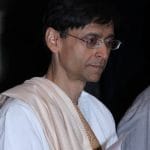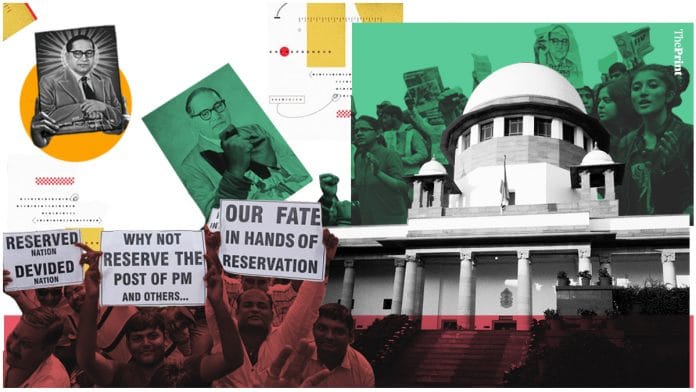Congress leader Rahul Gandhi attacked the Narendra Modi government saying that it is “in the DNA” of the BJP and RSS to end the reservation policy. Parliament witnessed heated exchanges on Monday in response to the Supreme Court judgement last week, which overturned a 2012 Uttarakhand High Court verdict, and ruled that reservations and promotion quotas are not a fundamental right.
ThePrint asks: SC on reservations: Does politics hamper objective review of India’s quota for Dalits, OBCs?
Quotas end up violating right to equality. We must foreground competence again, not just deprivation
 Makarand R. Paranjape
Makarand R. Paranjape
Director, Indian Institute of Advanced Study
India’s Supreme Court has adjudicated that reservation is not a fundamental right. As Justices L. Nageswara Rao and Hemant Gupta said, “There is no fundamental right which inheres in an individual to claim reservation in promotions”.
Clearly, caste is a superimposition, a social construct. Its removal, too, must be part of a concerted social, political, and economic action.
How can a quota, therefore, be a fundamental right? The existing six fundamental rights in the Indian Constitution are: right to equality, right to freedom of religion, cultural and educational rights, right to freedom, right to constitutional remedies, and right against exploitation.
What about right to equality and right against exploitation? It is precisely these rights that reservations, carried out mechanically, end up violating rather than upholding.
The Supreme Court has ruled that “it is for the state government to decide whether reservations are required in the matter of appointment and promotions to public posts”. This makes eminent sense. Even from the point of view of the public or national good, a rethink on reservations is absolutely imperative.
We must foreground competence again. Not just deprivation. If so, it is clear that it is politics, more than anything else, that hampers an objective review of India’s reservation policy.
Views are personal.
Quota worked wonders, led to rise of a Dalit middle class. Instead of cheering it, caste Hindus feel threatened
 Chandra Bhan Prasad
Chandra Bhan Prasad
Dalit entrepreneur and author
The idea of reservations in India was born out of the Poona Pact, 1932. Mahatma Gandhi sat on fast unto death against separate electorates to Dalits that the British had awarded. Gandhi had sensed social division, so a middle path had to be found. Both sides — B.R. Ambedkar representing the depressed classes while Gandhi representing the larger Hindu society — climbed down from their positions to come to a consensus.
Hindus would embrace Dalits, integrate the community in public institutions. The sight of Ambedkar and Madan Mohan Malviya signing the document was the first in India’s known history where Dalits and Hindus had together sat on a negotiating table.
With reservations in education, jobs and politics, Dalits could dream of escaping the caste hierarchy, Hindus’ most valued system of discrimination. Reservations worked wonders, leading to the rise of a Dalit middle class, a section of which now competes in open category on some occasions.
A good number of Dalits have even topped some of India’s most valued competitive examinations. But instead of cheering their rise, the caste Hindus feel threatened. The great Indian consensus of embracing Dalits for the sake of nation-building has collapsed. Judges are unmasking themselves in exceptional haste, bureaucracy and media too have joined the caste dance. How bizarre the Hindu caste dance has turned out could be measured from the question posed here. Otherwise an enlightened media outlet, ThePrint makes certain kind of assumptions and asks a loaded question that joins the Supreme Court in dismissing reservation. Such is the collapse of the Ambedkar-Gandhi consensus.
For an objective review of reservation policy, India’s judicial system first needs to be reviewed
 Kiruba Munuswamy
Kiruba Munuswamy
Advocate, Supreme Court of India
I’ve observed the views on reservations of both sections of the Indian political class. The pro-reservation section strives for a secular, inclusive, diverse India while the anti-reservation section hampers the country’s development. Tamil Nadu, for example, has been successful in providing reservations for all communities, including Brahmins, Muslims and Christians. Yet, India does not score well on the World Justice Project’s Rule of Law 2019 Index that “aims to measure the rule of law based on the experiences and perceptions of the general public” in a country. I wonder if India will ever have a Dalit woman as the CJI.
I’m not convinced of the Supreme Court’s latest decision because a majority of its verdicts on reservation have been confusing and contradictory. Caste-based discrimination operates at all levels of management and institutional machinery in India and the top court is no exception.
It’s unsurprising that there has never been a Supreme Court judge who is a Dalit woman because there are barely any of them in lower or high courts to begin with. Courts are disconnected from the struggles of marginalised communities and, therefore, judges think along their political leanings, or the ones who are pro-reservation usually defer or confer. One exception, however, is former Supreme Court judge O. Chinnappa Reddy, who once observed how merit doesn’t survive in arguments on reservation.
In order to have an objective review of India’s reservation policy, it is the judicial system that first needs to be reviewed.
It was Congress that had first argued against SC/ST quota in promotions. Now it’s crying foul
 Guru Prakash
Guru Prakash
Assistant Professor, Patna University and Visiting Fellow, India Foundation
Seven decades since independence, Dalits still do not have access to government posts, be it in academia, media, bureaucracy or judiciary. For example, there has been no Dalit cabinet secretary in India and the community is also very poorly represented at the level of vice-chancellor in universities. These are top decision-making posts.
The Supreme Court, in particular, has been brutal against the principles of social justice enshrined in the Constitution because as an institution, it itself lacks diversity. There has so far been only one judge from the Dalit community in the Supreme Court — former chief justice K.G. Balakrishna. If this is the case, then you cannot expect the institution as a whole to be sensitive to the concerns of the marginalised communities.
When it came to the SC and ST (Prevention of Atrocities) Act, the Supreme Court held that these empowering measures were being misused. This was followed by a popular uprising, which forced the Narendra Modi government to intervene. So, I believe reservations at the level of promotion is quintessential in Indian democracy.
In my research, I have found that it was the Congress government that first put forth the case against SC/ST reservations in promotions. And now that the Supreme Court has upheld the intervention led by the Congress government, the party crying foul in Parliament is uncalled for.
Can’t separate politics from quota, which came out of political deliberations in the first place
 Nishikant Kolge
Nishikant Kolge
Associate Professor, CSDS
I think the question as to whether politics hinders an impartial review of India’s reservation policy is itself political. What we must ask is this: Can the Supreme Court’s verdict help us implement the reservation policy effectively and ensure that the core values of the Indian constitution — justice, liberty, equality, fraternity, human dignity — are upheld?
We should also ask ourselves whether we can make any judgment or amendment in the reservation policy without objectively reviewing it. These are pertinent questions that need to be asked first.
Yes, politics does hamper an objective review of India’s reservation policy. This is because reservation is deployed for those sections of society that have historically been denied their due rights, be it civil or political, but India’s political parties see reservations only as a means to secure votes.
However, there is no way by which one can separate politics from the debate around reservation. After all, the very idea and need for reservation was born out of political deliberations during the early years of independent India.
Every political group should rise above narrow interests & come forward to review reservation policy
 Swadesh Singh
Swadesh Singh
Assistant professor, Delhi University
Politics is an instrument of social transformation and India needs major changes in its caste system. This was the reason Babasaheb Ambedkar introduced the idea of reservation as a policy of affirmative action. So, reservation should continue without any doubt, but we need newer ways to execute affirmative action policies.
For that, we need an objective review of India’s reservation policy because it was implemented 70 years ago. But under previous regimes, the SC/ST reservation was not implemented properly and the OBCs did not get their due. Jawaharlal Nehru did not do anything for the well-being of the backward classes and Indira and Rajiv Gandhi governments ensured that the Mandal Commission recommendations remained only in files.
It was ultimately a non-Congress government led by V.P. Singh and formed with outside support of the BJP that implemented the OBC reservation.
There are lakhs of government jobs in India but more and more youth from the vulnerable and marginalised sections with higher education are unable to get through. India needs to ensure that the ambition of aspirational youth coming from different sections is fulfilled. Each and every political group should rise above its narrow interests, win the confidence of the weaker sections and come forward to review the reservation policy.
Also read: Modi govt’s job quota for ‘weaker’ upper castes: Desperate poll sop or meeting aspirations?
By Pia Krishnankutty, journalist at ThePrint







?
Dynamics of democracy should determine reservation policies. You can’t leave it to an arbitrator.
Most of these commentators are driven by their own prejudices, some even not speaking objectively and factually.
The policy was initially announced for ten years, although long historical wrongs cannot be redressed overnight. However, seventy years is three generations, by this stage a programme for gradual phase out ought to have been discernible. Instead, reservations continue to spread, like Calcutta’s famous banyan tree. The sensible 50% cap mandated by the apex court, striking a balance between merit and equity / social justice, has been overwhelmed by recent inclusions, including those for dominant castes like Marathas who are at the apex of the state’s power pyramid. Difficult to support reservation for the economically less well off people belonging to the “ forward “ castes. Anything goes, when a tough election looms. 2. Normally, a sensitive issue like this, which can create social tensions, ought to be dealt with by the executive and the legislature. However, if they remain in thrall to electoral compulsions, the apex court should not feel diffident. It should look after the interests of those whom professional politicians are not treating with fairness.